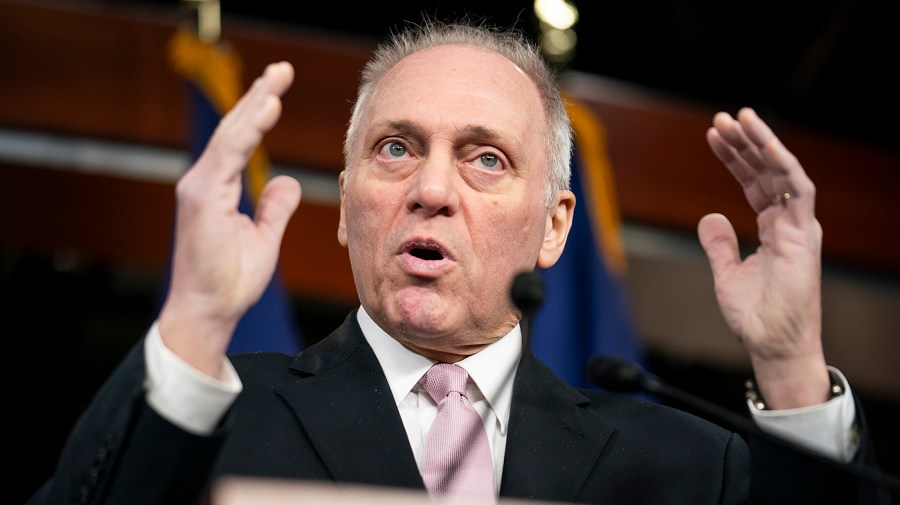House Republican leaders on Tuesday downplayed the possibility of cuts to Medicaid benefits as they seek a reconciliation bill with up to $2 trillion in savings.
Speaker Mike Johnson (R-La.) and Majority Leader Steve Scalise (R-La.) sought to reassure the public — and potential jittery members of their own caucus — that the Medicaid changes under discussion include work requirements and fraud reduction, not drastic cuts like lowering the federal match for Medicaid expansion states or instituting a per capita cap.
House Republicans are debating how deep they need to cut to pay for an extension of President Trump’s tax cuts and border enforcement funding, and how much political backlash they can endure.
One of the prime targets is Medicaid, the joint federal and state-funded program that provides health coverage to more than 72 million low-income Americans. Republicans see Medicaid as a program rife with fraud and abuse and have long sought to rein in its spending.
Their attempt to cut Medicaid spending as part of an ObamaCare repeal during Trump’s first administration failed, and the ensuing controversy contributed to their loss of the majority in the 2018 midterm elections.
But after winning control of both chambers of Congress and the White House in November, Republicans are trying again.
“Look, Medicaid has never been on the chopping block,” Johnson said during a press conference. “If you eliminate fraud, waste and abuse in Medicaid, you’ve got a huge amount of money that you can spend on real priorities for the country.”
Johnson also mentioned work requirements for “able bodied” people.
“You know, work is good for you, you find dignity in work. And the people that are not doing that, we’re going to try to get their attention,” Johnson said.
The House Budget Committee will unveil its budget resolution Wednesday, ahead of a Thursday hearing. The resolution will contain broad instructions for committees to find savings.
House Republicans are under mounting pressure to move a budget resolution to advance Trump’s domestic policy priorities.
Congressional Republicans are looking to use the budget reconciliation process to pass items on his wish list, which, if successful, would allow the party to circumvent Democratic opposition in the Senate. A reconciliation bill needs only a majority vote to pass the Senate, but both chambers need to pass an identical budget blueprint.
Work requirements would save about $100 billion over a decade. But hard-line conservatives are pushing for a bottom-line figure of at least $1.5 trillion to $2 trillion, which could necessitate even more cuts.
The most controversial changes, like lowering the federal match for the Medicaid expansion population and instituting a per capita cap, would save $561 billion and up to $900 billion over a decade respectively, according to House GOP estimates.
Scalise on Tuesday didn’t rule out going further on Medicaid cuts, but he also suggested the primary focus was work requirements.
“Work requirements in Medicaid is the place you would start,” Scalise said in an interview on CNBC. “When we’re running deficits, to be adding more people onto government programs and taking them off of private sector insurance doesn’t make a lot of sense.”
He later told reporters he wanted to let the committees of jurisdiction figure out the policy specifics.
“There’s a lot of waste in Medicaid that we’re going to be identifying, you know, other reforms that are being looked at,” Scalise said. “We need to let those committees get to work on getting more into the details of what their committees can pass. And what coalitions we can start putting together.”
But as House GOP members struggle to coalesce around just how far their conference and the White House is willing to go, the answer remains unclear. Republicans have only a slim majority in the House and will need every vote to pass the budget resolution on the floor.
“I’m hearing a lot of concerns on Medicaid from members. The president has been saying that he doesn’t want the Medicaid cuts and members are concerned about voting for something that is tough and doesn’t have a path,” one Republican told The Hill.
Another potential complicating factor is President Trump himself, who recently included Medicaid in the list of programs he vowed not to touch — with a catch.
“We’re not going to do anything with that, unless we can find some abuse or waste,” Trump said, vowing to “love and cherish” Medicaid.
“The people won’t be affected. It will only be more effective and better,” Trump said.
Energy and Commerce Committee chairman Rep. Brett Guthrie (R-Ky.) last week said he reached out to the White House for clarification, but by Tuesday he hadn’t heard back.
“So obviously we’ve got to do what we can get 218 votes for. I think we need to modernize Medicaid and make it sustainable, but we’ll see,” Guthrie said. “I don’t know the answer to that yet.”
Mychael Schnell contributed to this report.

